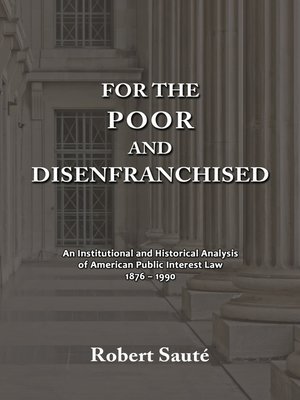For the Poor and Disenfranchised
ebook ∣ An Institutional and Historical Analysis of American Public Interest Law, 1876-1990
By Robert Saute

Sign up to save your library
With an OverDrive account, you can save your favorite libraries for at-a-glance information about availability. Find out more about OverDrive accounts.
Find this title in Libby, the library reading app by OverDrive.



Search for a digital library with this title
Title found at these libraries:
| Library Name | Distance |
|---|---|
| Loading... |
'For the Poor and Disenfranchised' is an historical and institutional analysis of the public interest bar in the United States. It traces how the legal profession delivered on the legal system's promise of equal justice for all by making the legal system available to all and a vehicle for substantive justice, exploring political mobilization, entrepreneurial lawyering, and pro bono publico representation."In this dramatic and detailed account, Robert Sauté documents the establishment and evolution of the public interest bar, particularly its struggles to provide zealous advocacy for its clients. Through meticulous historical research in case studies of the New York Legal Aid Society, NAACP, ACLU, and Legal Services Corporation, Sauté's book analyzes how access to the legal system has been affected by cultural and structural changes in society and in American politics. His chapter on pro bono in large firms reveals how a new generation of elite lawyers defines its commitment to professionalism and the poor."— Cynthia Fuchs Epstein, Distinguished Professor, CUNY"Sauté's study is a subtle and fascinating history of the development of public interest and poverty law in the United States, analyzing how the legal profession has responded to the needs of the poor and disenfranchised over time. Although there have been many advances in the ways those needs are met, Sauté closely examines the influence of the market, social movements and other factors and suggests that those responses have been inadequate, particularly in light of a legal system moving increasingly to the right."— Mark Potok, Senior Fellow, Southern Poverty Law Center







